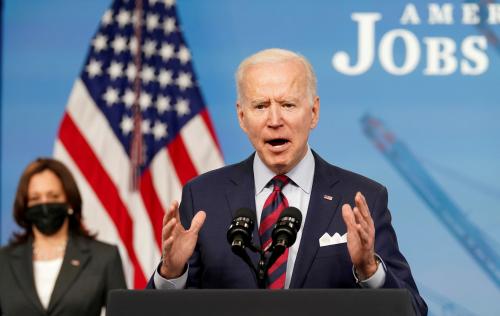The impending approval process of the USMCA provides an opportunity for Democrats in Congress to redress the situation and claim an important victory. Democrats could get the credit by ensuring that, at the end of the ratification process, North America has a gold-standard regulatory framework to address 21st century challenges. This is the right time for Democratic leadership to push for a proposal commensurate with the leverage it has, writes Luis de la Calle and Arturo Sarukhan. This piece originally appeared in The Hill.
The growing unilateralism and weaponization of trade policy by President Trump have turned into the most grievous risk for a rules-based international system that ensures fairness, reciprocity and a level playing field for global trade. If this trend continues, trade policy will end up being decided by interest groups with enough access to influence and game the political system. This corrupting influence will irreparably damage the global economy.
The impending approval process of the United States-Mexico-Canada Agreement (USMCA) provides a unique opportunity for Democrats in Congress to redress the situation and claim an important victory. The U.S. International Trade Commission (ITC) has released its assessment of the economic impact of the USMCA, a procedural step that clears the way for Congress to debate ratification of the agreement. It nonetheless looks increasingly likely that the process could become acrimonious and politically charged; leaders of both parties have been pushing the Trump administration with specific demands in exchange for supporting it.
A good number of House and Senate Democrats have insisted that the USMCA lacks an effective enforcement mechanism to guarantee compliance with its new labor provisions. They are right; as negotiated, the deal does indeed lack an effective dispute resolution and enforcement mechanism. The main gripe Democrats have had for a long time with the original North American Free Trade Agreement (NAFTA) is that its labor side-agreement is not part of the trade agreement itself and that, therefore, labor violations are not subject to the same level of disciplines.
The USMCA makes significant progress by not only incorporating labor and environmental provisions into the core text, but also by significantly expanding the coverage of labor disciplines. This is an important Democratic achievement.
However, bringing labor into the fold is useful only if the dispute resolution mechanism of the USMCA is effective. It is not. The position of the United States Trade Representative in the past few years has been not to strengthen but to weaken the dispute resolution mechanism in NAFTA, the World Trade Organization (WTO) and other agreements. This is profoundly mistaken and counterproductive and, going forward, is potentially a self-inflicted wound for the three North American economies.
If they could get their way, President Trump, U.S. Trade Representative Robert Lighthizer and White House adviser Peter Navarro apparently would rather implement unilateral enforcement mechanisms to continue abusing the imposition of import duties, as was evidenced by the tariffs on steel and aluminum imposed a year ago by the administration on Mexico and Canada. By claiming that they were needed because of national security, they not only were a slap in the face of two neighboring countries, which closely collaborate with the United States precisely on security issues, but they also unnecessarily created a roadblock to USMCA approval — and in the process hurt American consumers and businesses, mainly in the Midwest, because of retaliatory tariffs imposed by Mexico and Canada. The long overdue elimination of Section 232 tariffs is a welcome burst of momentum for the USMCA in Congress.
That is why the USMCA will function properly only if the dispute resolution is effective not just on labor and the environment, but also for trade issues. And unilateral U.S. certification of Mexican labor compliance, as being discussed on Capitol Hill, should not and cannot be the solution. It is asymmetrical and violates the principle of reciprocity and equality key to any trade agreement.
Democrats could solve the conundrum by introducing language — preferably in the implementing bill, but potentially also in a trilateral side letter to Chapter 31 of the agreement — to ensure that dispute resolution works properly. To do so, Congress can instruct the executive, via implementing legislation, to present by a certain date the names of the panelists for dispute resolution proceedings, to avoid frequently-used delay tactics, and to respect panel rulings whenever these occur.
Moreover, Congress — in reclaiming back authority over trade matters — can state that for the United States not to adhere to a ruling (and thus be subject to retaliatory measures from other parties), a vote is required by the legislative branch. Finally, members of Congress could agree that Section 232 cases — such as current tariffs on aluminum and steel imports — would be subject to a panel review so that the system is not abused and retaliation is implemented only after the ruling. Of course, Canada and Mexico would have to agree to the same terms.
If Democrats were to leverage the ratification process of the USMCA and their core objective to seek and ensure effective enforcement of labor provisions, in order to reinstate a working and effective dispute resolution system, this would become a model for dealing with other pressing issues in WTO and in negotiations with China.
The main objective of NAFTA was to increase trade and investment between the United States, Mexico and Canada. This largely happened. Mexico just surpassed China to become the United States’s largest trading partner, and Canada is its largest market (Mexico is second and growing). The challenge now is how to structure trade and investment so that North America becomes more competitive in global markets, particularly Asia and Europe. This is much more likely to happen with the three countries working together and becoming a model for the international trading system.
If North America shows, through the revamped USMCA, that the rule of law and effective enforcement can underpin a profitable and competitive deeper integration, the impact will be felt worldwide.
Timing and political calculations — and miscalculation by the president — could potentially further complicate USMCA ratification. A good crisis should never go to waste. Democratic members of Congress have a unique opportunity they did not expect to encounter and should see approval of the USMCA not as a problem but as an opportunity to show leadership on an issue in need of constructive thinking. Now that Mexico has approved agreed-upon and groundbreaking labor amendments, the approval process can — and should — begin in Congress.
Democrats could get the credit by ensuring that, at the end of the ratification process, North America has a gold-standard regulatory framework to address 21st century challenges. This is the right time for Democratic leadership to push for a proposal commensurate with the leverage it has. In Shakespearean terms, ’tis a tide they should not lose.
The Brookings Institution is committed to quality, independence, and impact.
We are supported by a diverse array of funders. In line with our values and policies, each Brookings publication represents the sole views of its author(s).










Commentary
Democrats should seize the day with North America trade agreement
May 22, 2019